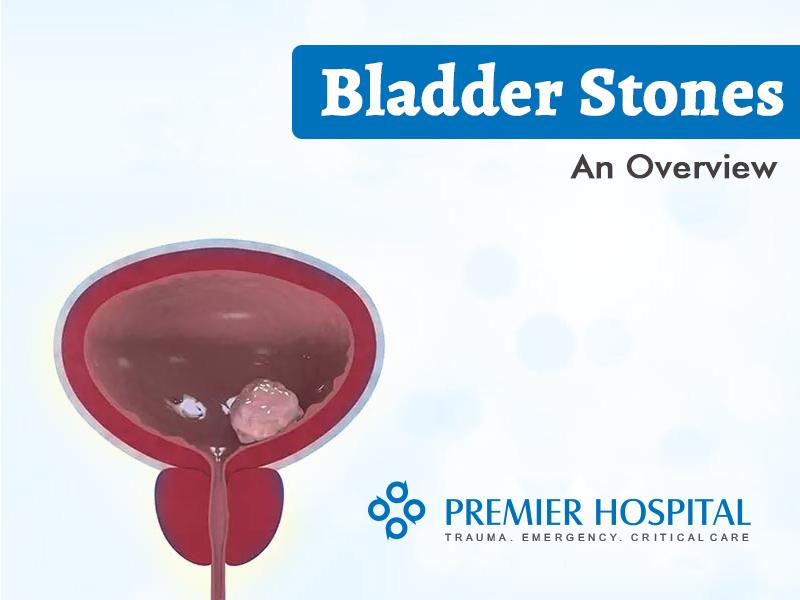Bladder Stones: An Overview
by Premier Hospitals | February 7, 2019 |
Every morning, after we wake up, our daily routine is almost the same as everyone. Our daily ablutions apart, emptying our bowel and bladder or using the toilet is a part of our routine. Sometimes, in our hurry to get to work or due to other perceived priorities, we use the restroom in a hurry. And as the old English adage goes, "Haste makes waste". When you empty your bladder in a rush, many times, the bladder may not completely be emptied, and some urine might be left behind.
The urine which left is behind in the urinary bladder causes the damage. It becomes a focus of infection by allowing germs to grow in it. And over time, the sediments that form as a result of this can become concentrated and turn into tiny crystals. These tiny crystals together combine slowly and form into a ball or ‘stone’ like structure, and this is called a ‘Bladder Stone’.
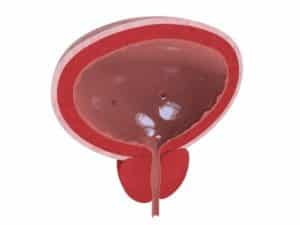
What exactly a bladder stone is? How are they formed?
The scientific name of a bladder stone is ‘Vesical calculus’. We already discussed what could be one of the reasons for the formation of bladder stones.
Usually, the size of the stones are small and in most cases, they are not dangerous as they pass through the urine eventually. But the problem arises when these stones get stuck to the wall of the bladder. The more time they stay on the wall, the more crystals they gather and the bigger they become. And this could lead to a lot of problems for the person suffering from them.
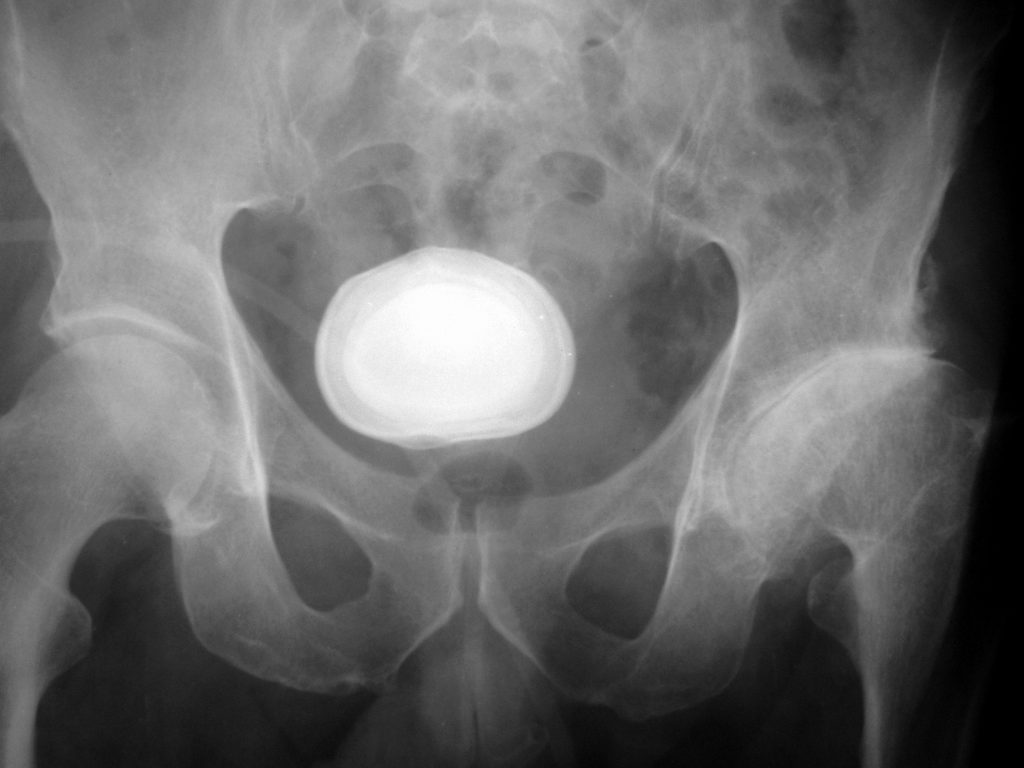
Generally, in most cases, bladder stones don’t show any symptoms. You will not even know the existence of stones until you get an X-ray done. So, as part of your master health check, if this is a problem that worries you, then it is better to get an X-ray to confirm that you don’t have a growing ‘stone’ in your body.
How To Know If You Have A Bladder Stone?
As discussed above, in most cases bladder stones do not show any symptoms irrespective of the size of the stone. However, some of the symptoms or the changes that you might notice in your daily routine if you have a bladder stone are:- pain in lower abdomen
- In men, pain or discomfort in the penis or testicles
- A burning sensation or pain during urination
- Frequent urination

- Difficulty urinating or interrupted urine flow
- Blood in the urine
- Cloudy or abnormally dark textured urine
Meet a doctor immediately if you face any of the above symptoms.
What causes a bladder stone?
Well, you know that incomplete urination is the primary cause of bladder stones. But what's the reason, why is someone not able to urinate completely?
There are many underlying causes. Let’s get to know some of these causes.
Enlargement Of Prostate Grand: It is also another common condition that causes bladder stones. In most cases, when the prostate gland is enlarged, pressure builds on the urethra and creates a disturbance in urine flow, thereby preventing emptying of the bladder.
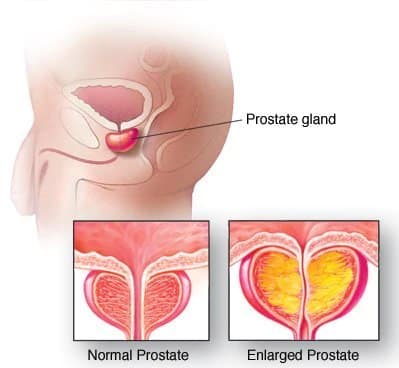
Neurogenic Bladder: In this condition, the nerves that control bladder function may get damaged when a person suffers from problems like stroke, Parkinson's disease, spinal cord injuries, diabetes, a herniated disk, etc. This prevents the person from generating enough force to empty the bladder completely. People with neurogenic bladder might have an enlarged prostate or some other bladder problems as well.
Medical Devices: Bladder stones might also be caused by using various medical devices (e.g.- Bladder catheters) - thin tubes which are inserted to drain urine from our bladder through the urethra. In this procedure, some objects may accidentally migrate to the bladder which can lead to the formation of bladder stones later.
Kidney Stones: Kidney stones are different from bladder stones. Often small kidney stones travel through the ureters to the bladder. If they are too large to expel out of the bladder, they may remain in the bladder and grow in size as bladder stones.
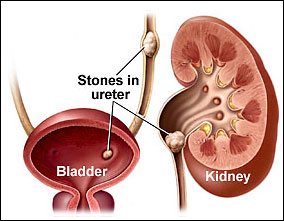
Bladder inflammation: Bladder inflammation, i.e. enlargement of the bladder wall due to some urinary tract infections or even due to any radiation therapy that the patient might have undergone, can also lead to incomplete emptying of the bladder.
How To Treated Bladder Stones?
If the stones are small, doctors recommend drinking a lot of water so that they can be expelled out through the urine. But, the problem arises when the stones are too big to pass out. These kinds of bladder stones are treated through two different procedures which follow:
Breaking Bladder Stones In To Pieces:
This is an invasive procedure; here doctor inserts a tube into the urethra with a camera fixed at the end so that the doctor can have a view of the stone which helps in breaking the stone easily. This procedure is called cystolitholapaxy.
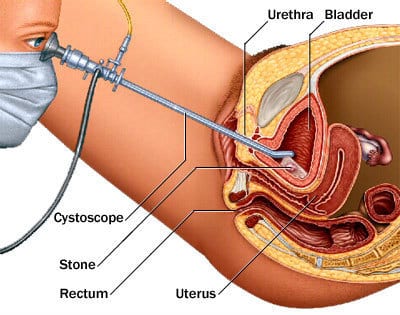
Doctors break down the stone into smaller particles with the help of ultrasound or laser so that they can be passed out through the urine itself. Usually, the broken pieces are removed by washing them or vacuuming them away. However, this is a highly effective procedure, there were few side effects such as infections or tears in the bladder walls.
Surgery:
If the stones are too big to remove by breaking them down with the cystolitholapaxy procedure, then the ultimate option is going for surgery to get rid of the stones out of the body.
Most of the diseases and conditions do not start by being serious or harming the body to a great extent; the case is the same with bladder stones as well. It begins as small particles and turns out to a giant ball which affects your whole body. So, don't waste time or take a chance over bladder stones. Visit our experts at Premier Hospital and get that X-ray done so our doctors can help you remain free of any bladder stones in the future!
About The Hospital:
Since the inception of Premier Hospital in 1991 till today, we have grown to unprecedented levels, due to our excellence in medical sciences and healthcare. Premier Hospital is the creation of Dr. Mahesh Marda and when it was first established, was only a small, 30-bed hospital facility. Back then, we provided only secondary care to patients, but that certainly has changed in the present landscape.





